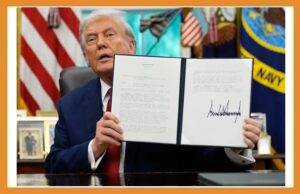Under Donald Trump direction America on Wrong Direction

A growing share of Americans say the country is headed in the wrong direction under Donald Trump’s leadership, according to new polls that show deep unease not only among Democrats and independents but increasingly within his own Republican base. The latest data suggests Trump faces a paradox. While Republican voters remain his strongest source of support, they are also growing increasingly pessimistic about the country’s trajectory. If that mood deepens, it could sap enthusiasm heading into 2026. A September Verasight poll found that only 28 percent of adults believe the U.S. is “on the right track,” compared to 60 percent who say it’s “off on the wrong track.” Another 12 percent said they were unsure. That marks a sharp drop from August, when the split was 33 percent to 57 percent. The downward trend is confirmed by other surveys. Gallup found that just 29 percent of Americans are satisfied with the way things are going in the U.S., the lowest level since Trump took office in January. That’s down from 31–33 percent over the summer and well below the 38 percent peak in May. It comes as satisfaction had been trending upward after Trump’s inauguration, buoyed by Republican optimism. The latest drop, however, suggests that confidence within his party is beginning to fray. The Gallup data shows the sharpest declines among Republicans, with satisfaction falling to 68 percent in September, from 76 percent in August. Independents (23 percent) and Democrats (1 percent) remain flat. Other surveys reinforce the trend. According to AP-NORC, the share of Republicans saying the U.S. is headed in the wrong direction has surged from 29 percent in June to 51 percent in September. Among Republicans under 45, that number leapt by 30 points to 61 percent. These polls come after the September 10 assassination of conservative activist Charlie Kirk, an event that appears to have rattled Republicans and accelerated doubts about the country’s trajectory. A Quinnipiac poll found that 79 percent of voters believe the U.S. is in a political crisis, with overwhelming agreement among Democrats (93–6 percent), independents (84–14 percent), and a majority of Republicans (60–35 percent). Meanwhile, Gallup polling shows that the fallout from Kirk’s assassination has shifted Americans’ sense of national priorities. Gallup found mentions of crime or violence as the country’s top problem rose from 3 percent in August to 8 percent in September, the highest in five years. Concern about national unity doubled from 5 percent to 10 percent, the highest since the aftermath of January 6. But partisan divides are clear. Republicans drove most of the increase in concern about crime, jumping from 6 percent to 14 percent, while independents fueled the spike in unity concerns, climbing from 5 percent to 13 percent. YouGov polling also found that 59 percent of adults think political violence is a very big problem. That includes 58 percent of Democrats, 54 percent of Independents, and 67 percent of Republicans. Historically, Democrats and Republicans are more likely to say political violence is a big problem after attacks on members of their own party. Nonetheless, Quinnipiac analyst Tim Malloy said that the Kirk assassination “lays bare raw, bipartisan concerns about where the country is headed.” Republicans have responded with near-uniform outrage and grief to the assassination of Kirk, describing his killing as both a personal tragedy and a political turning point. Trump was among the first to speak out, calling Kirk’s death a “dark moment for America” and praising him as “a tremendous person” who devoted his life to the conservative cause. Within days, he ordered flags to be flown at half-staff and announced that Kirk would receive the Presidential Medal of Freedom posthumously. At a memorial service in Arizona, Trump elevated Kirk as a “martyr for American freedom” and placed blame on the “radical left” for creating what he described as the climate of hostility that led to the shooting. Other Republican lawmakers struck similar notes. Senate Majority Leader John Thune and Senator Mike Lee both praised Kirk’s influence on the conservative movement and condemned the violence that ended his life, calling the assassination a reminder of America’s increasingly dangerous political climate. Vice President JD Vance also echoed Trump’s framing, urging supporters to treat the killing not just as an act of violence, but as part of a broader cultural battle, warning that those who mocked Kirk’s death online were contributing to the same climate the president condemned.

